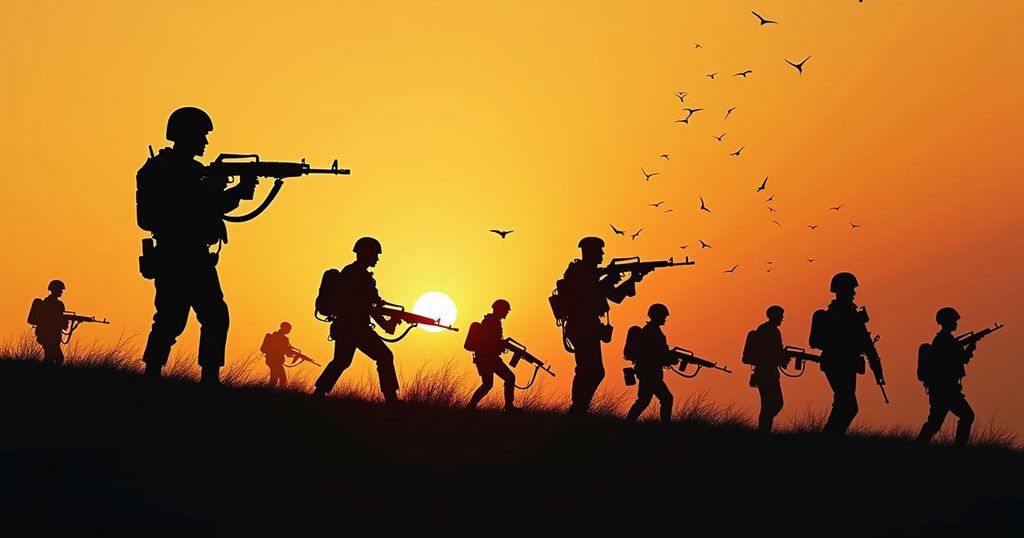Escalating Tensions: Hezbollah Clashes with Israeli Forces Amid Intensified Operations in Gaza

Hezbollah clashes with Israeli forces in Lebanon as Israel intensifies airstrikes in Gaza, resulting in civilian casualties. The situation is aggravated by calls for U.S. military action against Iran, flight cancellations in the region due to escalating tensions, and humanitarian concerns for displaced families struggling to access basic necessities.
Hezbollah is actively engaging Israeli forces in Lebanon amid escalating military actions by Israel in Gaza. Israeli media reports indicate that helicopters have been deployed to evacuate soldiers injured in a Hezbollah attack in the southern region of Lebanon. In response to these developments, Israeli fighter jets conducted missile strikes on the family home of journalist Ahmed al-Zard, located southeast of Khan Younis in southern Gaza. This attack tragically resulted in the deaths of several family members, including al-Zard’s brother, uncle, and two cousins. Reports suggest that al-Zard is in serious condition along with his mother and another brother and that emergency services faced obstacles from Israeli forces while trying to provide assistance to those trapped under the rubble. In the United States, political rhetoric is intensifying, particularly among Republican officials calling for military action against Iran following the missile barrage targeting Israel. Concurrently, the UAE-based airline, FlyDubai, announced the suspension of flights to several countries, including Jordan, Iraq, Iran, and Israel, a decision reflective of the heightened regional tensions and the temporary closure of airspace. Jordanian authorities confirmed minor injuries resulting from the violence and reiterated their commitment to protecting the nation from being drawn into the conflict. International responses include strong condemnations of Iran’s actions. Australian Prime Minister Anthony Albanese characterized the missile attack on Israel as a severe escalation and emphasized the need for de-escalation to protect civilians. Kamala Harris participated in briefings with President Biden and the National Security Council, echoing the established U.S. position of unwavering support for Israel. Japanese Prime Minister Shigeru Ishiba expressed that the Iranian missile strike is “unacceptable” and seeks collaboration with the U.S. to mitigate further tensions. Analysts suggest that Iran may view its missile actions as necessary to counter escalating Israeli hostilities. The International Rescue Committee has warned that a significant number of Lebanese families displaced by Israeli actions are struggling to meet their basic needs, highlighting a dire humanitarian crisis, with children being disproportionately affected.
The ongoing conflict between Hezbollah and Israel, along with the military operations in Gaza, has escalated tensions in the region, impacting both local populations and international relations. The Israeli airstrikes targeting militants in Gaza, in conjunction with Hezbollah’s responses, have led to significant casualties and raised humanitarian concerns. With the involvement of the U.S. and other global powers speaking out against Iranian aggression, the situation reflects broader geopolitical dynamics, including debates around defense policies and responses to acts of aggression. The implications of these actions on civilian life, particularly among displaced families, are critical to understanding the humanitarian crisis unfolding in the region.
In summary, the current military engagements between Hezbollah and Israeli forces, coupled with Israel’s intensified offensives in Gaza, have led to tragic casualties and a burgeoning humanitarian crisis, particularly affecting children and displaced families. The international response has included significant political rhetoric, calls for military action against Iran, and expressions of support for Israel. As stakeholders navigate this complex landscape, the need for violence de-escalation and humanitarian assistance remains urgent as the civilian population continues to bear the brunt of these conflicts.
Original Source: www.aljazeera.com





